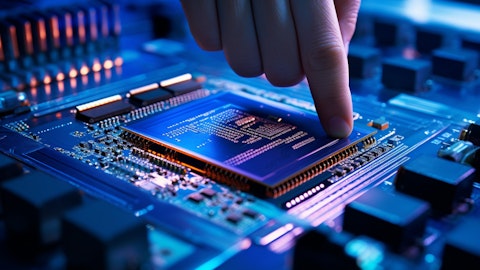Charlie Chan: In that case, would you aggressively spend the capacity because outsourcing is more likely?
C. C. Wei: Certainly. We are expanding our capacity with US$28 billion to US$32 billion. That’s a big money. That what we used for 3-nanometer and 2-nanometers at capacity.
Mark Liu: Let me add some color to this. I think C. C. has been very modest. I think he’s claimed that N3P is comparable to their 18A. We still affirm our statement. But I would like you to look at a different perspective. And what C. C., what the other side, the claim might be right, but it’s only to their own product. And IDN typically their technology for their own product. We have foundry us, we optimize our technology for our customers’ product. So, that’s a big difference. What you use for the high-power server could be very different than what used was the sketches on your hands, smartphone or even the large data edge AI processors. So, you should look at this, I think the time compared with PPA, we still affirm our statement, but I think just look at our customers’ action that just tell us all the stories.
Charlie Chan: Thanks, Mark. So, Jeff, can I go to the second one? Yes. So, Mark, so first of all, I really appreciate your leadership. I believe our global investors appreciate your past six-year, create lots of shareholders value. Thank you. My question is about the content of your speech in November. The speech was about the TSMC in the era for AI. You mentioned some, very interesting data points. You used AI technology to improve the defense clarification, also the EUV throughput by, for example, 10%. Now it’s the generative AI can be very big breakthrough in terms of technology. Do you think Samsung or Intel, by leveraging the generative AI, can really break through and catch up your technology? And also, before your retirement, any kind of a big unfinished goal or targets for TSMC? Thank you.
Jeff Su: Thank you, Charlie. Charlie’s second question is directed to Chairman. He noted in November, Chairman gave a speech where he shared how TSMC has always been utilizing big data, machine learning and AI to improve our operational efficiencies. His question is, whether now with generative AI, will this enable or allow our competitors to do the same thing and catch-up and narrow the gap?
Mark Liu: Thank you, Charlie. The talk I gave in last November was the audience is the Taiwan’s industry companies. The purpose I want to give that is, I see artificial intelligence can be a great opportunity for the industry in Taiwan. Just like Taiwan is a big country for semiconductor, it can be a good big country for artificial intelligence in the future, that’s how I encourage them. As far as whether our competitor are using AI, of course, they use AI. Just look at the all the company AI company in Silicon Valley or in US, that’s not a secret. But on the other hand, AI is only in its nascent stage. Only last November, the first large language data is announced, ChatGPT announced. We only see the tip of the iceberg. I want to give a industry a optimistic note that, even though 1-nanometer or sub 1-nanometer could be challenging, but we have a new technology capability using AI to accelerate the innovation in science and that is our part.
And we have been working on that for many years already. So, of course, it’s a fair competition. It’s no secret.
Jeff Su: You have another question about one?
Mark Liu: Yes. Indeed. I will retire in June and from now to June is a long time. In the company, a lot of thing can happen. I hope we definitely execute to C.C.’s forecast of this year. I think by the middle of this year, I think we are pretty sure, we can accomplish that. Of course, C.C. just mentioned our technology development is on the slew of success. By June this year, we will know what we are going to fare in 2025. I give our executive a milestone. I don’t want to share with you, but it’s going to be very exciting for TSMC. And of course, from now on, I simply want to encourage our people in TSMC that the world has changed. Just like you mentioned, we have to use artificial intelligence for future technology. So, we will go into global, we try our global footprint, and we are trying our digital excellence.
By digital excellence, you mean we can’t count on the hardworking of Taiwan engineer. Only we have to recreate our job to tap their talents and lift up the semiconductor technology engineering to a different level base on what we already have. And of course, the corporate governance is one thing I always in my heart. During this transition, I want every executive and our board to adhere to the sound corporate governance so that we make sure all the process steps is abided by our ethical governance rules. Thank you.
Jeff Su: Okay. Thank you, Chairman. Let’s take the, move on to the second person from the floor. I think in front, Bruce Lu of Goldman Sachs, please.
Bruce Lu: Thank you. Again, the question is definitely coming from the AI for sure. I think as C. C. mentioned, almost every AI chip is working with TSMC. However, the investors’ concern is always like the dollar content as a percentage of customers’ cost for AI is a lot lower than smartphone or other chips. So as also, C.C. mentioned that, you sell a wafer for your customer, but when you buy it back, it’s a lot more expensive. So, can we expect that the dollar generated by TSMC from AI, can be increased in the coming years, whether it’s through like no migration or advanced packaging or anything we can expect or what kind of rate we can expect for that?
Jeff Su: Let me summarize Bruce’s first question. I think, again, he is around AI related. He notes that, basically, almost all the innovators are working with TSMC at AI, but the value per chip that we seem to be capturing is lower than for a smartphone or PC. So, his question is that, I think can we expect the dollar value captured by TSMC to increase in the next few years? And will this be, this additional value more come from the front-end process node wafer production or will it be through the advanced packaging solutions?
C. C. Wei: Well, let me answer the easiest one first. The revenue come from the front end and back end together. To capture the value, yes, we are working on it, definitely. But first, let me say that I’m very happy that my customer has been very successful in the AI area and we are a key enabler for the AI applications. So far today, everything you saw on the AI, it’s come from TSMC. Now, here come the questions, how we’re going to capture the value. We are working on it, and actually, we see today, they say that the component of total value in the AI, the whole AI data center is a very small percentage amount. If we narrow down the AI component or the semiconductor’s value in the whole system, yes, it’s a small percentage.





